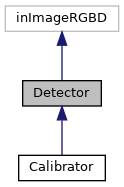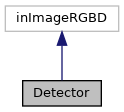

Public Member Functions | |
| def | __init__ (self, detCfg=None, detInst=None, processors=None) |
| Constructor for layered puzzle scene detector. More... | |
| def | adapt (self) |
| Adapt the layer detection models. More... | |
| def | correct (self) |
| Apply correction process to the individual detectors. More... | |
| def | detect (self, I) |
| Apply predict, measure, correct process to source image. More... | |
| def | emptyDebug (self) |
| def | emptyState (self) |
| Get and empty state to recover its basic structure. More... | |
| def | getDebug (self) |
| def | getState (self) |
| Get the complete detector state, which involves the states of the individual layer detectors. More... | |
| def | info (self) |
| def | load (inFile) |
| def | loadFrom (fPtr) |
| def | measure (self, I, M=None) |
| Apply detection to the source image pass. More... | |
| def | predict (self) |
| Generate prediction of expected measurement. More... | |
| def | process (self, I) |
| Apply entire predict to adapt process to source image. More... | |
| def | saveTo (self, fPtr) |
| Save the instantiated Detector to given HDF5 file. More... | |
Static Public Member Functions | |
| def | buildFromCfg (theConfig) |
| Instantiate from stored configuration file (YAML). More... | |
| def | calibrate2config (theStream, outFile, initModel=None) |
Public Attributes | |
| config | |
| depth | |
| hand | |
| imHand | |
| mask | |
Constructor & Destructor Documentation
◆ __init__()
| def __init__ | ( | self, | |
detCfg = None, |
|||
detInst = None, |
|||
processors = None |
|||
| ) |
Constructor for layered puzzle scene detector.
- Parameters
-
[in] detCfg Detector configuration. [in] detInst Detection instances for layer(s). [in] processors Image processors for layer(s).
Reimplemented in Calibrator.
Member Function Documentation
◆ adapt()
| def adapt | ( | self | ) |
Adapt the layer detection models.
Does nothing. There may nto be enough information to know how to proceed.
Reimplemented in Calibrator.
◆ buildFromCfg()
|
static |
Instantiate from stored configuration file (YAML).
◆ calibrate2config()
|
static |
◆ correct()
| def correct | ( | self | ) |
Apply correction process to the individual detectors.
Apply naive correction on a per detector basis. As a layered system, there might be interdependencies that would impact the correction step. Ignoring that for now since it does not immediately come to mind what needs to be done.
Reimplemented in Calibrator.
◆ detect()
| def detect | ( | self, | |
| I | |||
| ) |
Apply predict, measure, correct process to source image.
Running detect alone elects not to adapt or update the underlying models. The static model is presumed to be sufficient and applied to the RGBD stream.
- Parameters
-
[in] I Source RGB-D image (structure/dataclass).
Reimplemented in Calibrator.
◆ emptyDebug()
| def emptyDebug | ( | self | ) |
Reimplemented in Calibrator.
◆ emptyState()
| def emptyState | ( | self | ) |
Get and empty state to recover its basic structure.
- Parameters
-
[out] estate The empty state.
Reimplemented in Calibrator.
◆ getDebug()
| def getDebug | ( | self | ) |
Reimplemented in Calibrator.
◆ getState()
| def getState | ( | self | ) |
Get the complete detector state, which involves the states of the individual layer detectors.
- Parameters
-
[out] state The detector state for each layer, by layer.
Reimplemented in Calibrator.
◆ info()
| def info | ( | self | ) |
Reimplemented in Calibrator.
◆ load()
| def load | ( | inFile | ) |
◆ loadFrom()
| def loadFrom | ( | fPtr | ) |
◆ measure()
| def measure | ( | self, | |
| I, | |||
M = None |
|||
| ) |
Apply detection to the source image pass.
- Parameters
-
[in] I An RGB-D image (structure/dataclass). [in] M Optional mask indicate candidate hand regions (true) but with presumption that there may false positives.
◆ predict()
| def predict | ( | self | ) |
Generate prediction of expected measurement.
The detectors are mostly going to be static models, which means that prediction does nothing. Just in case though, the prediction methods are called for them.
◆ process()
| def process | ( | self, | |
| I | |||
| ) |
Apply entire predict to adapt process to source image.
@param[in] I Source RGB-D image (structure/dataclass).
Reimplemented in Calibrator.
◆ saveTo()
| def saveTo | ( | self, | |
| fPtr | |||
| ) |
Save the instantiated Detector to given HDF5 file.
The save to function writes the necessary information to re-instantiate a Detectors class object to the passed HDF5 file pointer/instance.
- Parameters
-
[in] fPtr An HDF5 file point.
Reimplemented in Calibrator.
Member Data Documentation
◆ config
| config |
◆ depth
| depth |
◆ hand
| hand |
◆ imHand
| imHand |
◆ mask
| mask |
The documentation for this class was generated from the following file:
- /local/source/python/Surveillance/Surveillance/layers/HoveringGlove.py